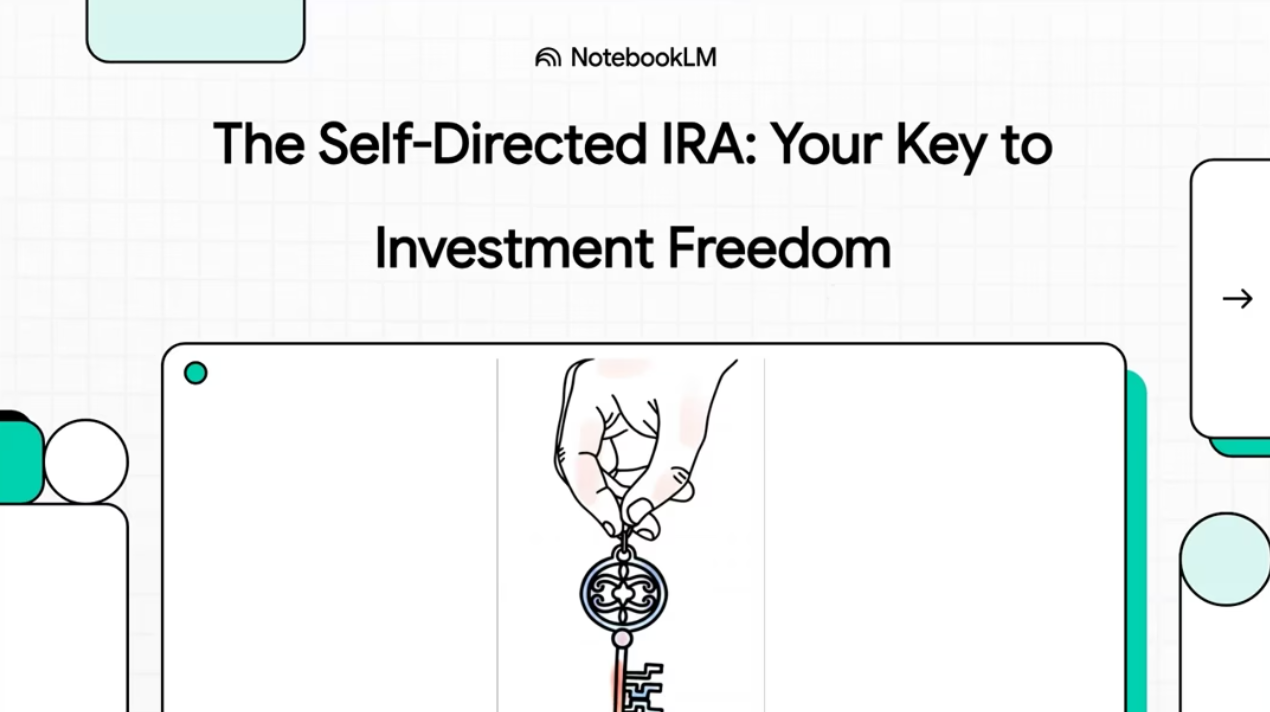Trusted knowledge. Proven insights. All Self-Directed.
.webp)








Episode 1: Safeguard Advisors Overview


Episode 2: The Power of Real Estate: Using Your Self-Directed Retirement Account to Invest in Real Estate


Episode 3: Checkbook Control: Mastering Self-Directed Retirement


Episode 4: Prohibited Transactions & Self-Directed Retirement: What You Need to Know


Episode 5: Solo 401(k) 101: The Ultimate Retirement Tool for the Self-Employed


Why Your Self-Directed IRA Matters in the 2016 Real-Estate Market


You Can be a Local Real Estate Expert [CHECKLIST]


Why You Need Your Retirement Plan in Place Before Investing


Why IRA Real Estate Investors Need Checkbook Control


Why Flip Lending is a Great Option in 2021


Who Should I Name as my Beneficiary for my Self-Directed IRA?


Who Can be a Registered Agent for an IRA LLC


Which Self-Directed Retirement Plan is Best for Me? Part II [CHECKLIST]


Which Self-Directed Retirement Plan is Best for Me? Part I


When to Open Your Solo 401(k) to Maximize Tax Benefits


What is the Best State for My IRA LLC?


What Happens to Your Solo 401(k) if Your Business Hires Employees?


What Happens if I Move After Setting up an IRA LLC?


Updates


Understanding UDFI Tax Impact in Multi-Family Real Estate Syndications: Part 2


Understanding UDFI Tax Impact in Multi-Family Real Estate Syndications: Part 1


Understanding Roles in a Solo 401(k)


Understanding Roles in a Checkbook IRA


Turnkey Diligence: Evaluating a Turnkey Provider


Transactional Lending for Quick Profits in Your IRA


Top Home Flipping Markets for 2016


Top 5 Self-Directed IRA Investment Choices in 2021


Top 5 Investments with a Self-Directed IRA


Tips to Effectively Manage Required Minimum Distributions


Tips to Diversify Your Real Estate IRA Portfolio


Tips for Vetting a Property Manager for Your IRA Rental


Tips for Screening Renters for your IRA Property


Timberland Investing With a Self-Directed IRA


Think Outside the Stock Market: 4 Alternative Ways to Invest Your IRA


Theory vs. Reality: Why IRA Investors Could Care Less About Loss of Depreciation Write-Offs


The Role of Digital Transformation in Modern Business


The Right Insurance for Real Estate Investing


The Importance of Tenant Insurance for Investors


The Importance of Regular Rental Property Inspections for Landlords or Property Managers [CHECKLIST]


The Benefits of Sustainable Business Practices


The Importance of Creating an IRA Rental Property Business Plan


The Advantages of Renting to Digital Nomads


The 10 Best Markets for IRA Investment Properties in 2015


Tax Time IRA & Solo 401(k) Contribution Tips


Tax Liens vs. Foreclosure Investments


Tax Lien & Deed Due Diligence


Take Control of your Properties with the Centriq App


Syndication Diligence: Fees and Sponsor Compensation


Syndication Diligence: Evaluating a Sponsor


Steering Clear of Prohibited Transactions in a Self-Directed IRA [CHECKLIST]


Syndication Diligence: Evaluating a Project


Solo 401(k) Checkup [CHECKLIST]


Solo 401(k) Bank Account Structure – Tips & Tricks


Self-Directed IRA Rules Every Investor Should Know [Infographic]


Solo 401(k) + Multiple Businesses = Control Group


Solo 401(k) + Multiple Businesses = Control Group


Should I Invest my IRA in a Startup?


Should I Hire a Property Manager to Manage my IRA Investment Property?


Should Employer Plans Offer Cryptocurrency?


Self-Directed IRA LLC Checkup [CHECKLIST]


Secure 2.0 Legislation – Big Changes for Retirement Plans (2 of 2)


Secure 2.0 Legislation – Big Changes for Retirement Plans (1 of 2)


Safeguard Adds Solera Bank as Custodian Partner


SEC Expands Access to Crowdfunding and Private Placements


Roth Conversions in a Self-Directed IRA


Roth Conversions in a Self-Directed Solo 401(k)


Retirement Investing: Stock Market vs. Real Estate [Infographic]


Rollover A Solo 401(k) to a Checkbook IRA


Resolve to Protect Your Financial Data


Required Minimum Distributions After the SECURE & CARES Acts


Real Estate vs. Stocks—Why Real Estate Wins: Part 2 [CHECKLIST]


Required Minimum Distributions (RMDs) & Your Retirement Plan


Rental Property in your IRA: Turnkey vs DIY


Real Estate vs. Stocks—Why Real Estate Wins: Part 1


Real Estate Investing with a Self-Directed IRA/401(k)


Real Estate Flipping 201: The Hybrid Flip Approach Buy/Fix/Rent… then Sell


Real Estate IRA and Required Minimum Distributions


Real Estate 201: Flipping Property with Your Self-Directed IRA [CHECKLIST]


Real Estate Flipping 201: How to Use Your Self-Directed IRA to Flip Real Estate


Real Estate Flipping 201: Be the Bank – Lend with a Self-Directed Plan


Real Estate Due Diligence


New Construction Trends Every Real Estate Investor Should Know


Navigating the Challenges of Business Expansion


Multiple Employer 401(k) Plans


Make Your Property (Manager) Work for You [Infographic]


Lease-Option Rentals are Increasing in Competitive Real Estate Markets


Landlord Tools Every Real Estate Investor Needs


Landlord Lessons: 3 Surefire Tips to Reduce Vacancy Rates [CHECKLIST]


Is a Solo 401(k) My Best Self-Directed Plan Option?


Investing in Rental Property vs. Notes in a Self-Directed IRA [CHECKLIST]


Is 2020 the Year for a Roth IRA Conversion?


Investing in Real Estate with Tax Lien Purchases [CHECKLIST]


Investing in Real Estate Debt Funds With Your Self-Directed IRA


Investing in Private Equity Real Estate Funds With Your Self-Directed IRA


Investing in Crowd Funds with a Self-Directed IRA


Investing in Non-Performing Notes


Investing in Businesses with a Self-Directed IRA


Invest your IRA in Bitcoin and Other Cryptocurrencies


Integrating a Stock Portfolio with Your Self-Directed IRA


Including Your Spouse in Your Solo 401(k) Plan


IRA Real Estate Strategies for 2017


IRA Mortgages – A Path to Maximizing Returns


IRA Investments in Real Estate Partnerships


IRA Flipping Machine – Using a UBIT Blocker


Hybrid Flips: A Pathway to IRA Profits
What our clients says about us
Quick answers to common questions
We’ll take you through a simple, step by step process designed to put your investment future into your own hands…immediately. Everything is handled on a turn-key basis. You take 100% control of your Retirement funds legally and without a taxable distribution.
YES! In 1974, Congress passed the Employee Retirement Income Security Act (ERISA) making IRA, 401(k) and other retirement plans possible. Only two types of investments are excluded under ERISA and IRS Codes: Life Insurance Contracts and Collectibles (art, jewelry, etc.). Everything else is fair game. IRS CodeSec. 401 IRC 408(a) (3)
It’s actually pretty simple. Early on, regulators let the securities industry take the lead in educating the public about retirement accounts. Naturally, brokers and banks promoted stocks, bonds, and mutual funds—giving the impression that those were the only allowed investments. That was never true... and still isn’t. You can probably guess why they kept the rest under wraps.
It is possible to use funds from most types of retirement accounts:
- Traditional IRA
- Roth IRA
- SEP IRA
- SIMPLE IRA
- Keogh
- 401(k)
- 403(b)
- Profit Sharing Plans
- Qualified Annuities
- Money Purchase Plans
- and many more.
It must be noted that most employer sponsored plans such as a 401(k) will not allow you to roll youraccount into a new Self-Directed IRA plan while you are still employed. However, some employers will allow you to roll a portion of your funds. The only way to be completely sure whether your funds are eligible for a rollover is by contacting your current 401(k) provider.
A Solo 401(k) requires a sponsoring employer in the format of an owner-only business. If you have a for-profit business activity – whether as your main income or as a side venture – and have no full-time employees other than potentially your spouse, your business may qualify. The business may be a sole-proprietorship, LLC, corporation or other entity type.
A self-directed retirement plan is a type of IRA or 401(k) that gives you greater control over how your retirement funds are invested. Unlike traditional accounts held at banks or brokerage firms that limit you to stocks, bonds, and mutual funds, self-directed plans allow you to invest in a wide range of alternative assets including real estate, private businesses, precious metals, cryptocurrency, and more.
These plans still follow the same IRS rules and maintain the same tax-deferred or tax-free benefits as conventional retirement accounts. The difference is simply in how and where you choose to invest.
No. Moving to a self-directed IRA or Solo 401(k) does not trigger any taxes, as long as your funds are eligible for rollover.
Self-directed retirement plans maintain the same tax-advantaged status as traditional plans offered by banks or brokerage firms. The key difference is flexibility—our plans are designed to give you greater control and allow for a wider range of alternative investments beyond stocks, bonds, and mutual funds.
A prohibited transaction is any action between your retirement plan and a disqualified person that violates IRS rules and can lead to serious tax consequences. Under IRS Code 4975(c)(1), prohibited transactions include:
- Selling or leasing property between your plan and a disqualified person Example: Your IRA cannot purchase a property you already own.
- Lending money or extending credit between the plan and a disqualified person Example: You cannot personally guarantee a loan your IRA uses to buy real estate.
- Providing goods or services between your plan and a disqualified person Example: You can’t use your personal furniture to furnish a rental property owned by your IRA.
- Using plan income or assets for the benefit of a disqualified person Example: Your IRA cannot buy a vacation home that you or your family use.
- Self-dealing by a fiduciary (using plan assets for their own benefit) Example: Your CPA shouldn't loan your IRA money if they’re advising the plan.
- Receiving personal benefit from a deal involving your IRA's assets Example: You can’t pay yourself from profits your IRA earns on a rental.
If a transaction doesn’t clearly fall within the allowed guidelines, the IRS or Department of Labor may review the situation to determine if it qualifies as a prohibited transaction.
Disqualified persons are individuals or entities that are prohibited from engaging in certain transactions with your IRA or 401(k). Doing so could trigger a prohibited transaction, which may result in taxes and penalties.
Here’s who is considered a disqualified person:
- You (the account holder)
- Your spouse
- Your parents, grandparents, and other ancestors
- Your children, grandchildren, and their spouses
- Any advisor or fiduciary to the plan
- Any business or entity owned 50% or more by you or another disqualified person, or where you have decision-making authority
These rules exist to prevent self-dealing and ensure your retirement plan remains in compliance with IRS regulations.
(Reference: IRC 4975)
Understanding and following these rules can be tricky, but it’s very doable. The best way to stay compliant is to work with professionals who specialize in self-directed retirement plans. They can help you navigate IRS guidelines and avoid prohibited transactions.
If an IRA holder is found to have engaged in a prohibited transaction with IRA funds, it will result in a distribution of the IRA. The taxes and penalties are severe and are applicable to all of the IRA’s assets on the first day of the year in which the prohibited transaction occurred.
Yes. While self-directed retirement plans allow for a wide range of investments, there are a few important restrictions.
You cannot invest in collectibles or life insurance contracts, and you must avoid prohibited transactions—activities that benefit you personally rather than the retirement plan. These include things like buying or selling property to yourself or family members, using plan assets for personal gain, or self-dealing in any way.
Violating these rules could cause your entire IRA to lose its tax-advantaged status. To protect your account, it’s essential to work with professionals who understand IRS regulations and can help you stay compliant.
This is a common misconception. In many cases, professionals may simply be unfamiliar with self-directed retirement plans, as they fall outside their usual scope of work. CPAs and tax preparers are trained to file taxes, not necessarily to advise on alternative retirement strategies. Financial advisors and brokers often work for firms that focus on traditional investments like stocks and mutual funds—and may not benefit from or support alternative options like real estate or private lending.
Self-directed retirement investing is legal under IRS rules—but like any specialized area, it requires working with professionals who understand how it works.
The IRS has rules in place to make sure your IRA is used only for the exclusive benefit of the retirement account—not for personal gain or to help family members. These rules can get complicated because there are many ways a conflict of interest can occur, even unintentionally.
For example, if your IRA buys a house and rents it to your mother, you might be reluctant to evict her if she stops paying rent. That emotional connection creates a conflict between what’s best for your IRA and your personal relationships, something the IRS aims to prevent.
These rules help ensure your retirement account stays compliant and protected. (See IRC 408)
Yes. Most tax-deferred retirement accounts—such as Traditional IRAs, old 401(k)s, 403(b)s, and TSPs—can be rolled over into a self-directed IRA or Solo 401(k), depending on your eligibility. Roth IRAs cannot be rolled into these accounts.
You can contribute directly from earned income, subject to annual IRS contribution limits. The method and amount depend on the type of plan you have (e.g., Solo 401(k) vs. IRA).
To take a distribution, you'll request funds through your custodian or plan administrator. Distributions may be taxable depending on your account type and age. Early withdrawals may be subject to penalties.
For 2025, the Solo 401(k) max contribution limit is $81,250 if age 60-63, $77,500 if age 50-59 or 69+, and $70,000 if under 50. Traditional and Roth IRAs have a limit of $7,000 ($8,000 if age 50+). Limits are subject to IRS adjustments.
Yes. IRA contributions are typically due by your personal tax filing deadline (e.g., April 15). Solo 401(k) contributions follow your business tax filing deadline, including extensions.
IRS reporting requirements vary depending on the type of self-directed retirement plan you have. Here’s a quick breakdown of what you need to know
Please note: Our team can help you understand what’s required for your specific account, but we don’t provide tax or legal advice. We always recommend working with a qualified tax professional to ensure full IRS compliance.
Self-Directed IRA (Traditional or Roth)
- Form 5498 – Filed by your custodian each year to report contributions, rollovers, and the fair market value (FMV) of your account.
- Form 1099-R – Issued if you take a distribution or move funds out of your IRA.
- Annual Valuation – You'll need to provide updated FMV for any alternative assets held in the account, such as real estate or private placements.
Solo 401(k)
- Form 5500-EZ – Required if your plan assets exceed $250,000 as of year-end. Must be filed annually by the plan participant.
- Form 1099-R – Required if you take a distribution or roll funds out of the plan.
- Contribution Tracking – Keep records of employee and employer contributions. These are not filed with the IRS but may be needed for tax reporting or audits.
SEP IRA
- Form 5498 – Filed by your custodian to report contributions and FMV.
- Form 1099-R – Filed by your custodian. Issued for any distributions.
- Employer Contributions – Must be reported on your business tax return (and on employee W-2s, if applicable).
Health Savings Account (HSA)
- Form 5498-SA – Filed by your HSA custodian to report contributions.
- Form 1099-SA – Filed by your HAS custodian. Issued for any distributions.
- Form 8889 – Must be included with your personal tax return to report contributions, distributions, and how funds were used.

